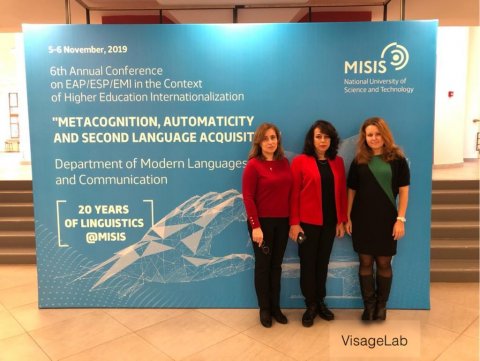An IELTS Teacher Training Workshop has been held at SUSU. The workshop was organized by Star Travel/ Star Academy Group of Companies, official partner of the IELTS BKC International House testing centre, jointly with the British Council.
For the academic staff of the Institute of Linguistics and International Communications, November has been a moth of intensive professional self-improvement. Elaboration of a system of continuous professional development for teachers is one of the tasks under М 8.1.3. “Implementing Advanced Language Training in Bachelor’s Programmes”.
The event was held in English by a certified British Council IELTS Teacher Trainer Olga Bukach. Among the workshop participants were academic staff of the Institute of Linguistics and International Communications, as well as English Language teachers from other universities and language centres.
The workshop covered the process of training for and passing IELTS and the issues on how to make this process more efficient and successful. Olga Bukach shared on the top-choice resources helping train students to pass IELTS successfully, on the typical mistakes being made by candidates at the exam, and the efficient strategies of completing the tasks in each of the four sections (Listening, Reading, Writing, Speaking). Teachers also learned about the main criteria of scoring at the exam.
In the end of the two-day workshop, the teachers shared their impressions.
Tatiana Peredrienko, М 8.1.3 coordinator (testing coach): “I’ve been certainly lucky to attend the methodological workshop on training for IELTS. From time to time, it’s good to systematize your knowledge and get a chance to take a new look at the practice of training attendees for this exam, which has already become a routine. It’s become a pleasant surprise that all the workshop sections strictly complied with their titles, goals and tasks. I’d like to note the materials were clearly structured and concisely presented. There’s no doubt that this workshop gives food for thought in terms of coming up with new ideas in teachers’ professional development and with regard to improving the method of training for IELTS.”

One week earlier, the academic staff of the Institute of Linguistics and International Communications attended a Training Workshop on the Skills of the 21st Century. Achieving Educational Results in Foreign Languages held with the participation of a leading counsellor of “ExpressPublishing” Steve Lever, and Marina Shirinyan, counsellor of the Linguistic Education Centre of “Prosveshcheniye” Publishing House. At this workshop, teachers discussed the methods and techniques of developing the so-called “soft skills”, which are important for careers of the future professionals, supra-professional skills intrinsic to successful participation in a working process: skills of communication, critical thinking, leadership, positive thinking, and the ability to work in a team, which ensure high performance and are transversal, that is are not tied to any certain subject field. The counsellors introduced the teachers community to the publishing house’s new products on special-purpose language teaching, including on training for professional exams.
Elena Yaroslavova, Director of the Institute of Linguistics and International Communications, М 8.1.3 supervisor: “We have long-standing partnership relations with publishing houses “Express Publishing” and “Prosveshcheniye”. Thanks to such workshops, teachers can quickly learn about the methodological developments of publishers and promptly implement all things new and promising.”
Early in November, М 8.1.3 supervisor Elena Yaroslavova and the project coordinators Irina Stavtseva and Tatiana Peredrienko took part in a Conference on EAP/ESP/EMI in the Context of Higher Education Internationalization. This event was followed by a two-day intensive advanced training course on Digital Pedagogy: Metacognition, Automaticity and Second Language Acquisition held at the Department of Modern Languages and Communication of MISIS National University of Science and Technology, Moscow, what allowed to adopt the best practices of the leading specialists in the field of teaching English in universities.
Irina Stavtseva (teacher trainer): “There exist two ways to intensify the mastery of a foreign language: through using the psychophysiological reserves of an individual, and through using new information technologies. The topics and contents of the conference at MISIS covered both. The speakers suggested truly innovative methods of teaching English, which imply the development of competences of the 21st century and are closely linked to modern information environment. Alternative data representation, augmented and virtual reality, multisensory learning claim their place in the world of education and open the door to the pedagogy of the future.”
Continuous professional development for teachers is one of the fundamental principles of improving the efficiency of teaching English under М 8.1.3. “Implementing Advanced Language Training in Bachelor’s Programmes”, which aims at helping students achieve the level sufficient for participating in international and scientific activities. The transition to the new format of training oriented at international standards of language mastery has changed not only the content and approaches, but also the motivation for language studying. In the beginning of December, the best students are planning on passing FCE and IELTS. Last year, 44 graduate students passed the international certification successfully.




